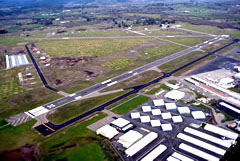 Sonoma County officials have agreed to pay $815,000 for a family’s property next to the Charles M. Schulz airport for a runway extension project, settling the contentious case on the eve of trial.
Sonoma County officials have agreed to pay $815,000 for a family’s property next to the Charles M. Schulz airport for a runway extension project, settling the contentious case on the eve of trial.
The amount is roughly twice the total of what the county previously offered to pay for the land, along with the relocation expenses for the 73-year-old matriarch who lives there.
“I’m happy that we settled, because it is not going to court,” said Rebecca Ritter, the main trustee for the six acres on Sanders Road, who had complained the airport was “stealing” her property.
She had been fighting the county for more than a year after it invoked the power of eminent domain to force the sale of the property.
The county had offered $135,000 for the 6.5 acres, despite it being valued by the assessor at $408,000 this year and $475,000 for several year prior.
The family, which has owned the property for 30 years, said it has been
paying taxes based on those assessments.
Although the county also had agreed to pay $279,000 for relocation expenses for the last remaining resident, Barbara Napoli, 73, her children said it
did not make up for the low-ball offer on the property.
Ritter said she was not trying to stop the airport improvement project, but wanted “just compensation” for the property being taken.
Neither attorneys in the county counsel’s office, nor Airport Manager Jon Stout responded to requests for comment Monday.
But Ritter’s attorney, Scott Jenny of Martinez, who specializes in eminent domain cases, said that in settling for $815,000 both sides “agreed it was a
fair and equitable assessment.”
“I think it’s a good result. I’m pleased with it,” he said.
The Sonoma County Board of Supervisors still must approve the settlement, which they reportedly may do as early as today.
Eminent domain, the power of government agencies to force the sale of private property for public use, is typically used for things like road
improvements, utilities, flood control and transit projects.
Sometimes it has been particularly controversial in private-public partnerships where cities have condemned land for shopping and business
centers, for example.
In addition to using it against the Al Ravani Trust named after Ritter’s late father, Sonoma County officials also employed it against another trust
to force the sale of 15 acres on Sanders Road.
The lands are being acquired for a $53.8 million runway extension and safety upgrade set to begin this month, mostly funded by federal grants.
While property owners facing eminent domain proceedings are forced to sell, they also are entitled to fair market value. But differing appraisals can
lead to litigation.
Ritter and her siblings were seeking a jury trial to determine the value of the property, which they claimed was worth $1.5 million, more than 10 times
what the county was offering.
But the county valued it at much less for a variety of reasons. The county said the home on the property was illegal, or essentially a “tear down.” And
officials said the soil didn’t pass percolation tests, meaning no new home could be built.
The controversy over the habitability of the 600-square foot structure Napoli lives in stemmed from a fire there a dozen years ago. When it was
rebuilt, the county said it was approved as a horse tack room and specifically not for human habitation.
The differing values also related to a disagreement over whether the property could be used for a wetlands mitigation bank and or establishing
vernal pools in which rare plants grow. Such projects can be highly lucrative because developers are required to buy into the banks to offset
the impact of their projects.
But the county argued there were too many obstacles to establishing such wetlands near the airport because they attract birds that can be a hazard to
airplanes.
Ritter on Monday said that once legal expenses are paid, she expects the family will be left with about $650,000. They may also be subject to some
capital gains taxes.
But Ritter said the plan is to try and buy five acres where her mother – who
suffers from anxiety and depression – can raise horses again.
It may be hard to match the beauty of the property they have, she said, “but I’m confident I will find the diamond in the rough out there, something that
needs a little love.”
“My father would want a place where she can live the rest of her days in
peace,” she said.
